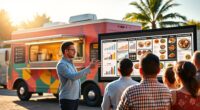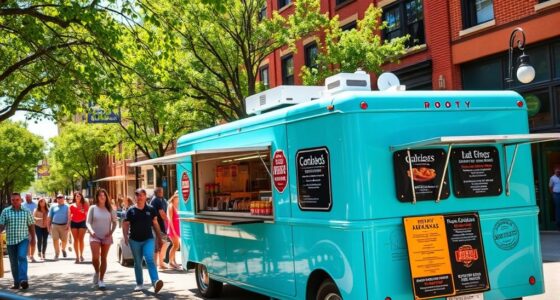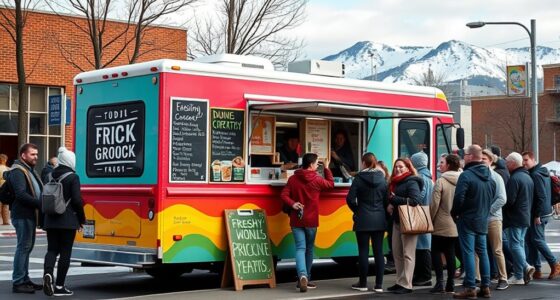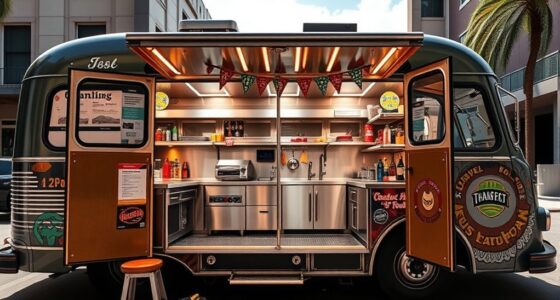Renting a food truck lowers your upfront costs and offers flexibility, making it easier to test markets and adapt quickly. Buying builds equity, allows full customization, and can save money long-term, but it entails higher initial expenses and ongoing maintenance. Your choice impacts mobility, branding options, and financial stability. We’ll explore how each option affects your budget, growth potential, and risks so you can decide what fits your goals best.
Key Takeaways
- Renting offers lower upfront costs and increased flexibility, ideal for testing markets or short-term operations.
- Buying involves higher initial expenses but builds equity and long-term cost savings.
- Renting shifts maintenance and repair responsibilities to the rental company, reducing owner liabilities.
- Buying allows full customization and branding control, enhancing business identity and asset value.
- Ownership provides long-term financial stability, potential resale value, and greater operational control.
Cost Implications and Budget Considerations
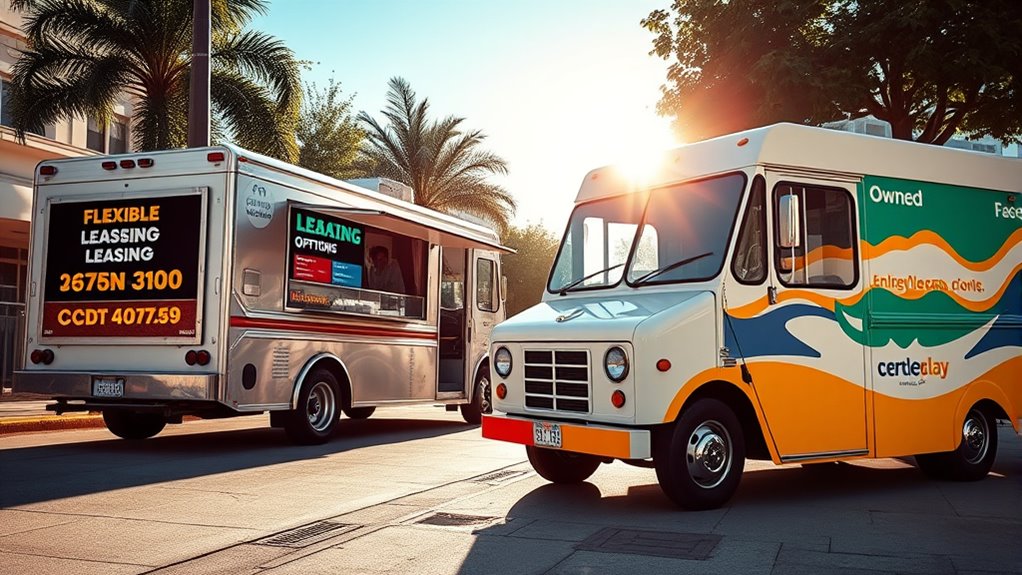
When deciding whether to rent or buy a food truck, understanding the cost implications is essential. Buying a truck involves higher upfront costs, including insurance premiums that can be significant depending on coverage and vehicle value. You’ll also need to contemplate financing options, such as loans or leasing plans, which can add interest and fees over time. Renting typically offers lower initial expenses, often including maintenance and insurance, making budgeting easier. However, long-term costs might add up, and you won’t build equity. If you plan to operate your food business for several years, buying could be more cost-effective. Conversely, renting provides greater flexibility and less financial risk if you’re testing concepts or unsure about long-term commitment. Additionally, the choice between leasing and buying impacts cost differences, which can influence your overall financial strategy.
Flexibility and Mobility Options

Choosing between renting and buying a food truck considerably impacts your flexibility and mobility. When renting, you often face fewer parking regulations and licensing requirements, making it easier to move quickly between locations. This flexibility allows you to test different markets without long-term commitments. On the other hand, owning a food truck grants you more control over parking, as you can navigate regulations to some extent, but it also means you must stay updated on licensing changes that vary by city or state. While ownership offers the freedom to operate almost anywhere, it can limit your mobility if you’re tied down by logistical or legal hurdles. Additionally, leveraging payment solutions can streamline transactions across multiple venues, enhancing your operational efficiency. Ultimately, your choice affects how easily you can adapt to new venues or events, shaping your business’s reach and growth potential.
Maintenance and Repair Responsibilities
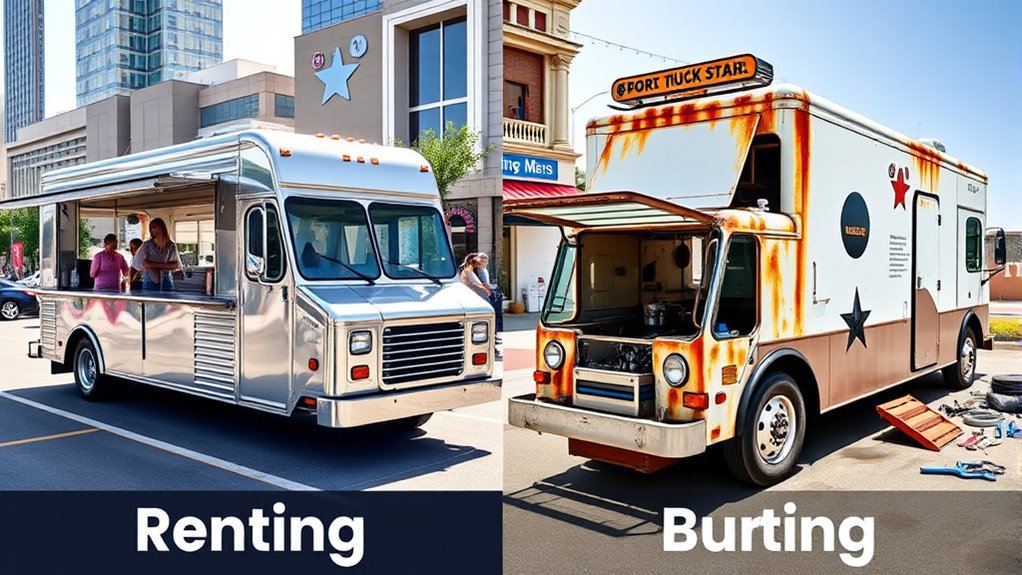
When you own a food truck, you’re responsible for all maintenance costs and repairs, which can add up quickly. Renting often includes support and repairs, saving you from unexpected expenses. Consider how these responsibilities impact your budget and operation before making your decision. Additionally, understanding projector technology can help you better assess the scope of maintenance involved in keeping your equipment in optimal condition.
Ownership Maintenance Costs
Owning a food truck means you’re responsible for ongoing maintenance and repairs, which can add up quickly. You’ll need to budget for regular upkeep, unexpected repairs, insurance costs, and licensing fees. These expenses vary depending on the truck’s age, condition, and usage. Proper maintenance helps prevent costly breakdowns, but neglecting it can lead to higher repair bills. Additionally, insurance costs fluctuate based on coverage and risk factors, impacting your overall expenses. Licensing fees are a fixed cost but essential for legal operation. To better understand, consider this:
| Expense Type | Frequency | Impact on Costs |
|---|---|---|
| Insurance costs | Annually | Ongoing, variable |
| Licensing fees | One-time or yearly | Fixed but necessary |
| Maintenance & Repairs | Regular/Unexpected | Significant, unpredictable |
Furthermore, incorporating automation technologies can help manage some maintenance tasks more efficiently, potentially reducing long-term costs.
Rental Support and Repairs
Renting a food truck often shifts maintenance and repair responsibilities to the rental company, which can alleviate you of many ongoing costs and logistical worries. This means they handle vehicle insurance, repairs, and regular upkeep, reducing your financial burden. You won’t need to worry about unexpected repair bills, and the company typically ensures the truck stays in good condition, including maintaining fuel efficiency. Since fuel efficiency impacts daily operational costs, the rental company’s management of maintenance helps optimize fuel consumption. Additionally, some rental agreements include celebrity lifestyle insights that can provide guidance on maintaining a professional appearance. However, you may have limited control over repairs and upgrades. Overall, renting offers support for repairs and maintenance, allowing you to focus more on running your business without the stress of vehicle downtime or costly fixes.
Customization and Branding Opportunities
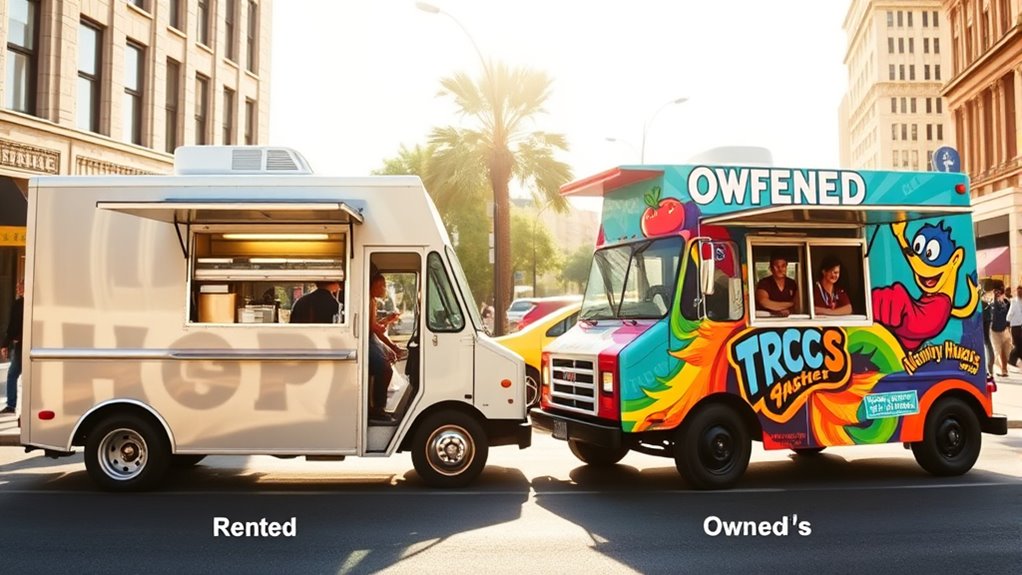
When it comes to customization and branding, you have more design flexibility with a purchased truck, allowing you to create a unique look that truly represents your business. Renting might limit your options, often offering pre-designed vehicles that restrict your brand’s identity. Owning your truck gives you full control over branding choices, so your truck stands out exactly the way you want. Additionally, hours of operation can be more flexible with ownership, enabling you to operate on your schedule without restrictions.
Design Flexibility Options
Choosing between renting and buying a food truck markedly impacts your ability to customize its appearance and branding. When it comes to design flexibility options, your choices influence how well you can tailor the interior design and menu customization to suit your brand. Renting often provides a pre-designed truck, limiting alterations but allowing quick setup. Buying, on the other hand, offers greater freedom to modify the interior layout and exterior branding elements. This flexibility enables you to create a unique customer experience and optimize space for your menu offerings. Consider these factors:
- Extent of interior design modifications
- Custom branding on exterior panels
- Adaptability for menu customization
- Integration of specialized equipment
- Future expansion or redesign options
- Unrepentant cheater strategies can also influence how you approach customizing and maintaining your food truck to ensure ongoing success.
Brand Identity Control
Opting to buy a food truck gives you the power to fully control your brand identity through customization and branding opportunities. With ownership, you can design the truck’s appearance to reflect your unique concept, ensuring brand consistency across all platforms. You can choose colors, logos, and messaging that resonate with your target audience, creating a memorable visual identity. This level of control enhances your marketing efforts, allowing you to stand out in a crowded marketplace. Renting may limit your ability to customize, making it harder to establish a cohesive brand image. When you own your truck, you have the flexibility to update branding elements as your business evolves, maintaining a strong, recognizable presence that builds customer loyalty and reinforces your brand’s message. Incorporating vintage decor and other rustic elements can further strengthen your brand’s personality and appeal.
Ownership and Equity Building

Owning a food truck allows you to build equity over time, turning your investment into a valuable asset. This ownership benefits you by providing a sense of stability and control over your business. As you make payments, your equity grows, increasing your net worth. With ownership, you can customize and upgrade your truck to suit your needs, further enhancing its value. Plus, you have the potential to sell or refinance the truck later, boosting your financial flexibility. Additionally, owning a food truck can provide opportunities for scenic views and natural beauty, which can be a unique selling point for your business.
Flexibility in Upgrading and Selling
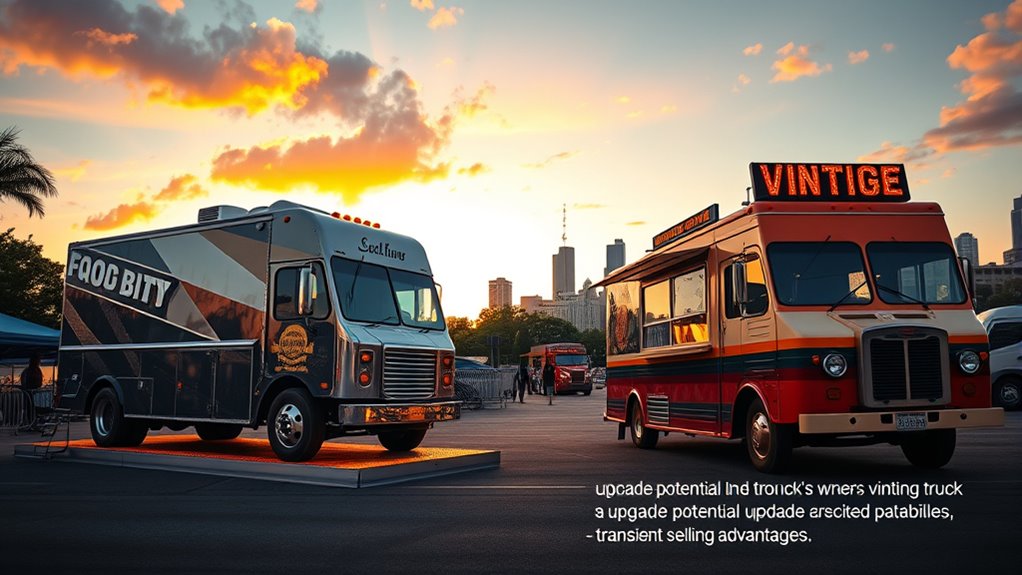
When you own a food truck, you gain the flexibility to upgrade and adapt it to meet changing needs or market trends. You can invest in new equipment, redesign the interior, or customize branding without restrictions. This freedom makes it easier to stay competitive and attract customers. Selling your truck is also simpler since you’re familiar with its condition and upgrades. However, keep in mind that insurance requirements and licensing procedures can impact your ability to modify or sell the truck. You’ll need to verify that upgrades comply with local regulations and update your insurance coverage accordingly. Managing licensing procedures may involve additional paperwork if modifications affect your permits. Overall, owning provides more control over upgrades and sales, but it requires careful attention to legal and insurance considerations. Incorporating fraud prevention tools and staying informed about transaction security can help protect your investment during such upgrades or sales processes.
Impact on Business Planning and Scaling

Purchasing a food truck can considerably influence how you plan and scale your business. Owning provides you with greater control over operational scalability and market adaptability, enabling quicker adjustments to demand and new locations. You can customize your truck to suit evolving needs without restrictions. However, it also means you need to contemplate long-term growth strategies from the start.
Key factors include:
- Investment in equipment and infrastructure
- Flexibility to expand or contract operations
- Ability to test new markets efficiently
- Streamlined decision-making for scaling efforts
- Capacity to adapt branding and menu offerings quickly
- Considering the initial investment and ongoing costs associated with owning a food truck can impact your long-term planning.
Owning a truck requires strategic foresight, but it empowers you to embed scalability and adaptability into your business foundation, shaping future growth opportunities.
Financial Risks and Liabilities
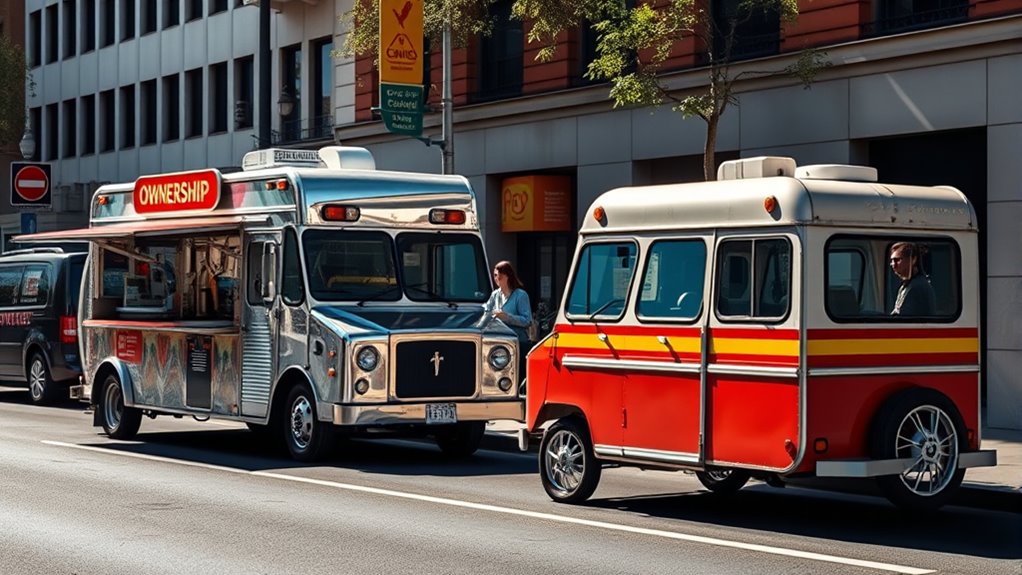
Taking on the financial responsibilities of owning a food truck introduces significant risks and liabilities that can impact your business stability. You’ll need liability insurance to protect against accidents, property damage, or injuries that could occur on your vehicle or food prep areas. Without proper coverage, you’re vulnerable to costly lawsuits that could threaten your finances. Additionally, legal compliance is essential; failing to meet health codes, licensing requirements, or safety standards can result in fines or even the shutdown of your operation. These liabilities mean you must budget not only for the upfront costs but also for ongoing expenses related to insurance, permits, and legal obligations. Proper maintenance and adherence to food safety standards can help prevent violations and potential penalties. Ignoring these risks can lead to serious financial setbacks, making it essential to plan carefully before committing to ownership.
Long-Term Cost Benefits
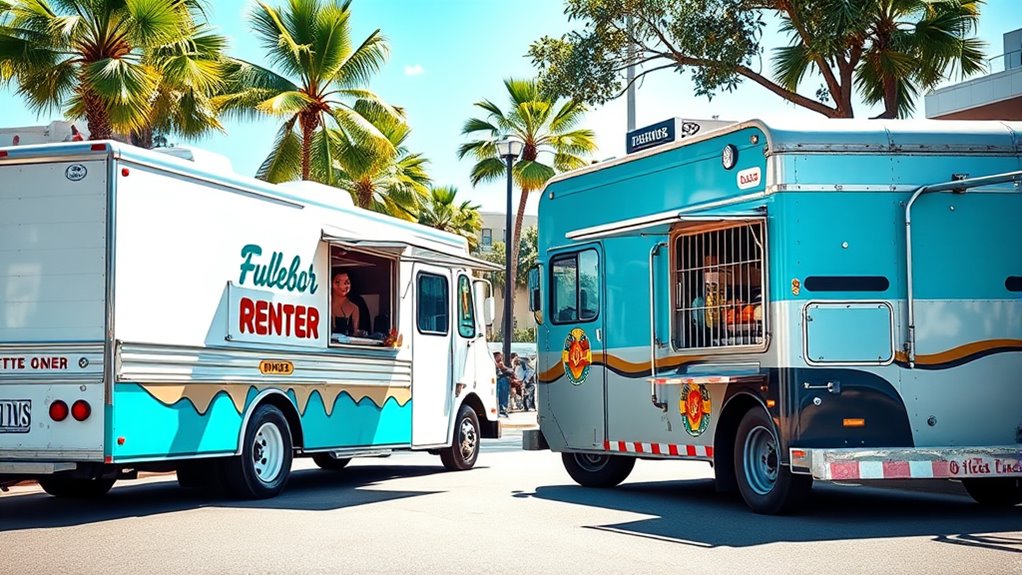
Over the long term, owning a food truck can be more cost-effective than renting, especially as your business grows. While initial expenses may be higher, you’ll benefit from lower ongoing costs. With ownership, you can control insurance costs and potentially reduce them through bundling. Additionally, the resale value of your truck allows you to recoup a portion of your investment when upgrading or exiting the business. Ownership also eliminates recurring rental fees, which can add up over time. You gain flexibility in customizing your truck to suit your brand and operational needs. Plus, owning a truck builds equity, making it a valuable asset. Furthermore, cost savings can be achieved through owning rather than renting in the long run. Overall, long-term ownership provides financial advantages that can support sustained growth and profitability.
Frequently Asked Questions
How Does Leasing Affect Tax Deductions for Food Truck Businesses?
Leasing your food truck affects your tax deduction strategies because lease payments are generally deductible as a business expense. You need to understand lease agreement nuances, such as whether payments are classified as operating or capital leases, which can influence your deductions. Keep detailed records of all lease-related expenses, and consult a tax professional to optimize your deductions and guarantee compliance with tax laws.
What Insurance Requirements Differ Between Renting and Owning a Food Truck?
Imagine your food truck cruising down the street, ready to serve. When renting, you typically need liability insurance and coverage for damages, but your provider may limit branding options. Owning means you’re responsible for extensive insurance that covers maintenance costs and custom branding, giving you more control. Both require proper coverage, but ownership usually involves higher premiums, reflecting the increased risk and freedom to modify your truck’s appearance and features.
Are There Restrictions on Operating Hours When Renting Versus Owning?
When it comes to operating hours and noise restrictions, your choices impact your flexibility. If you rent a food truck, landlords or local ordinances might limit your operating hours or enforce noise restrictions, potentially restricting your business hours. Owning allows more freedom to set your schedule, but you’re still bound by local noise laws. Always check specific local regulations to guarantee your operating hours comply and avoid penalties.
How Does Location Flexibility Vary Between Rented and Owned Trucks?
Think of your food truck as a ship on open waters—you want the freedom to explore. With a rented truck, you’re tied to specific locations, limiting your event flexibility and narrowing your market reach. Owning your truck is like having a vessel you can steer anywhere, expanding your options and maximizing opportunities. If you crave adventure and growth, owning gives you the latitude to chase new markets and exciting events.
What Are the Legal Considerations for Transferring Ownership or Lease Agreements?
When transferring ownership or lease agreements, you need to handle legal considerations carefully. You’ll typically require a title transfer to officially change ownership, ensuring all legal documents are updated properly. If you’re leasing, you might need to negotiate lease termination or assignment, depending on your lease terms. Always review the contract for specific clauses, and consider consulting a legal professional to avoid potential disputes or liabilities during the transfer process.
Conclusion
Choosing between renting and buying a food truck is like steering a road with many turns—each option has its own scenery. Renting offers flexibility and lower upfront costs, while buying builds equity and long-term savings. Think about your business goals and budget to steer in the right direction. Whichever route you take, make sure it fits your vision, so your food truck journey becomes a smooth ride rather than a bumpy road.

